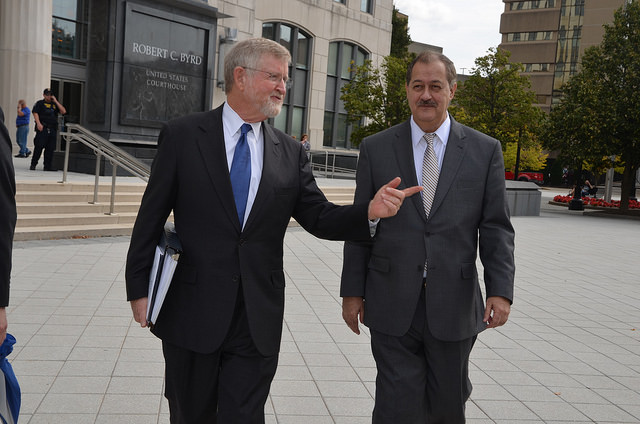Next in the Blankenship trial: David Hughart
October 12, 2015 by Ken Ward Jr.
Former Massey CEO Don Blankenship leaves the federal courthouse on Friday with his lead defense lawyer, Bill Taylor. Photo by Joel Ebert
A new motion filed today by defense lawyers for former Massey CEO Don Blankenship indicates that the government’s next witness is going to be David Hughart, a former longtime Massey official who previously pointed the finger at Blankenship.
Here’s part of today’s motion:
Defendant Donald L. Blankenship, through counsel, moves the Court for access to relevant portions of cooperating witness David Hughart’s presentence report and to the sealed portion of his plea hearing. The government does not oppose these requests. The defense also asks the Court to decide this motion expeditiously, because the government informed the defense after the court had recessed on Friday, October 9, 2015, that it intends to call Mr. Hughart as a witness on Tuesday, October 13, 2015.
Friday’s court session ended with prosecutors calling Sandra Davis, Blankenship’s former secretary, who helped them get into evidence a long list of memos, emails and reports — as well as those records of Blankenship’s telephone calls, some of which were played to jurors just before they went home for the three-day weekend.
Prosecutors had not finished their questioning of Davis yet, and defense lawyers still get to cross-examine her. But the new defense filing suggests Hughart may be next on the prosecution’s witness list.
Readers who have followed the Upper Big Branch investigation will recall that Hughart was sentenced to 42 months in prison after he pleaded guilty in a deal with prosecutors. There was a notable exchange in federal court in Beckley — during Hughart’s plea hearing — when he implicated Blankenship:
Judge: Am I to understand that there was a practice or policy there to give pre-notifications of inspections when MSHA investigators appeared on the property?
Hughart: Yes, your honor.
Judge: And as the president, did that policy come from you or through you to others on the site?
Hughart: Yes, ma’am, absolutely.
Judge: And, in other words, you had an agreement, I take it — and if I’m wrong, you tell me. I don’t want to put words in your mouth — with other officers and employees there that this type of notification would be given if an MSHA investigator came onto the site. Is that accurate or not?
Hughart: Yes, agreements with higher-ups and people lower.
And then there’s the big moment:
Judge: And when you say agreements with higher-ups, what officers are you talking about or people involved with this corporation?
Hughart: The chief executive officer.
Defense lawyers now want to get parts of Hughart’s pre-sentence report and a sealed portion of the transcript of a court hearing. Here’s why:
Based on statements made at Mr. Hughart’s sentencing hearing, the report also contains information about (1) his cooperation and agreements with the government, (2) relevant criminal conduct for which he was not prosecuted, (3) his substance abuse, and (4) his mental health, all of which constitute impeachment material under Brady and/or Giglio. The government has informed the defense that it is willing to disclose a redacted presentence report if the Court permits it to do so. The defense understands that the government has emailed to the Court a redacted copy of the presentence report and the full presentence report so that the Court can determine whether the redacted report is an adequate disclosure.
As we’ve written before:
Through his lawyer, Blankenship has denied any wrongdoing. And on his blog, Blankenship has said Hughart lied about him and was fired from Massey for drug use and stealing from the company.
And, from the day that Hughart was sentenced by Judge Berger:
Earlier Tuesday, Hughart’s $10,000 personal recognizance bond was revoked by U.S. Magistrate Judge R. Clarke VanDervort after Hughart was arrested on Aug. 30 on charges of possession of painkillers and anti-anxiety medication without a valid prescription. Hughart’s bond required him to comply with all local, state and federal laws.
Goodwin conceded that the drug charges reduce Hughart’s ability to help prosecutors as a courtroom witness, but also said his office has obtained more valuable assistance from other witnesses whose identifies have not yet been made public.
“You want to have all of the witnesses that you can,” Goodwin said. “We’ve identified witnesses who were in a position to know about this.”

 Subscribe to the Coal Tattoo
Subscribe to the Coal Tattoo
